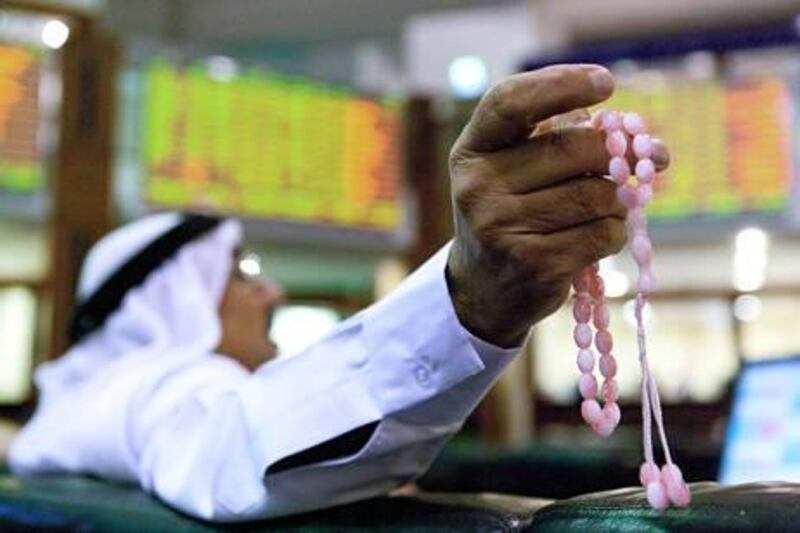A deadline approaches this week to determine whether the UAE and Qatar have done enough to secure an upgrading to "emerging market" status by MSCI Barra - with wary traders feeling a sense of deja vu.
Finance:
Industry Insights Exclusives you can bank on from The National's premium content. Learn More
Both countries' markets are classified as "frontier" by the index provider, largely because of undeveloped market infrastructure, despite per-capita wealth levels higher than in some developed markets.
In June, MSCI declined to upgrade either market, saying more time was needed to ensure the smooth functioning of the then newly introduced delivery-versus-payment mechanism (DvP), which ensures that payment is made the same day that an investor trades a share.
The announcement on whether the UAE had done enough to merit reclassification is due on Thursday morning at 2am local time, with speculation among traders driving trading activity on the Dubai Financial Market (DFM) to a two-month high last week.
Despite some optimism among brokerages, many traders were guarded after numerous failed attempts by the UAE to gain inclusion, said Fathi ben Grira, the chief executive at Mena Corp, an Abu Dhabi financial services firm.
"From my side, we're preparing ourselves and our budget as if there's no upgrade at all," he said.
And investors were split on whether the UAE would secure an upgrading, with Qatar viewed as even less likely because of tighter limits on foreign ownership, said Marc Foss, an executive director at Silk Invest, an investor in frontier and emerging markets.
"Most people's opinion is that not enough has changed [since June] to justify or warrant making the upgrade," he said.
Despite a rally for the UAE's markets last Sunday after the National Day weekend, markets inched back on Thursday to cap a lacklustre week for Middle Eastern bourses.
The newly launched S&P AFE 40 index of Arab blue-chip stocks rose 0.7 per cent to 54.39, while Abu Dhabi's and Dubai's indexes ended the week within a few points of where they started.
Some issues remain with the DvP mechanisms, particularly regarding cancelled trades of illiquid stocks, said Arindam Das, the head of securities services at HSBC Middle East.
"It's not a perfect 10, but it's an eight," he said. "There's a slight chance that something can still go wrong. Practically, that chance is very, very low. But from the MSCI point of view, they would probably say that they cannot rule that out."
The jury is still out on just how much local stocks would benefit even if the UAE were reclassified.
Since February 2009, managers of global emerging-market funds have shown "no willingness to own the UAE", with the Emirates sinking to 0.1 per cent of most portfolios, according to data from Bank of America Merrill Lynch.
In the event of an upgrading, the combined weighting of the UAE and Qatar of 0.35 per cent globally would be "too small to matter" for many fund managers, analysts from Credit Suisse wrote in April.
The real trouble for the UAE's markets was more fundamental, said Eric Swats, the head of assets management at Rasmala Investment Bank.
"For investors outside the region, it'll broaden their universe of potential securities," he said. "But the problem is related to the investment merits of the companies listed on the exchange. People don't want to participate in the companies here because they don't see strong opportunities for growth."
Markets have not experienced the sharp gains that preceded MSCI's last decision in June.
The DFM General Index rallied 16.7 per cent from the lows reached in March, driven at least in part by a sense that Dubai was a haven compared with countries in which governments had been overthrown during the Arab Spring.
This time around, investors are warier. Amid a sense of gloom surrounding the euro-zone debt crisis, the Dubai index fell last month to its lowest level all year. It has rallied 3 per cent since.
Tomorrow's exclusives tonight:
Industry Insights e-newsletter Get the pick of out premium Business content direct to your inbox. Sign up
However, investors have increasingly shifted towards stocks such as First Gulf Bank, which recently increased its limit on investment by foreigners by 15 per cent to 25 per cent of share capital, and away from other stocks with tight limits on foreign shareholding.
Recent laws, such as the revised Companies Law, which allows the Cabinet to decide on how closely UAE stocks are held by nationals, and draft regulations on short selling, securities lending, market making and liquidity providers are also considered signs of a maturing market and are likely to be viewed positively by MSCI.
twitter: Follow and share our breaking business news. Follow us





